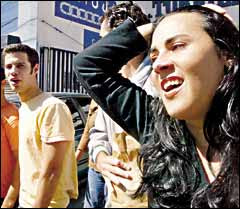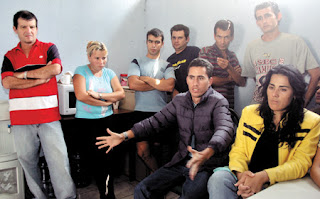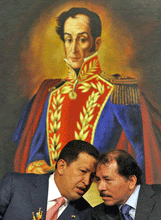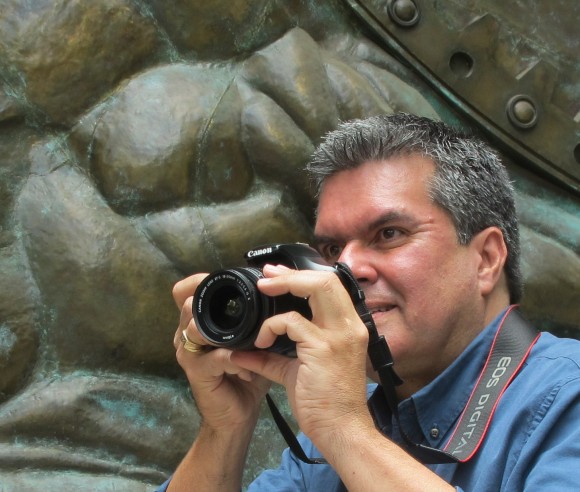Ahora que algunos están contentos porque el dictador Fidel Castro está recuperando la salud, me acordé de aquello de que por sus frutos los conoceréis; y gracias a De todo un poco, me encontré con este vídeo.
dictadura
07
Mar 07
¡Se fueron los cubanos!
Leo, y no puedo dejar de esbozar una sonrisa, que “Los 14 migrantes cubanos que habían solicitado refugio en Guatemala ya no se presentaron a Migración para continuar el trámite, lo que hace suponer que siguieron camino hacia EE.UU.” Pues a lo mejor estos no perseguían “el sueño guatemalteco”, sino “el sueño americano”.
El gobierno de Guatemala hizo bien en acogerlos ya que venían escapando de una tiranía; y si ellos decidieron no gozar de la hospitalidad chapina y buscar mejores horizontes, ¿se les puede juzgar mal? Yo creo que no. Por otro lado, ¿Debe, Guatemala, ser el cancerbero de la frontera con los Estados Unidos de América? También creo que no.
21
Feb 07
El caso de los cubanos, una decisión acertada
 Leo que “Los 14 cubanos que estaban retenidos en el albergue de Migración desde el 25 de enero último, han podido salir por primera vez a las calles de Guatemala, mientras se tramita su petición de refugio por causas humanitarias”; y pienso que esa ha sido una decisión acertada de la Administración.
Leo que “Los 14 cubanos que estaban retenidos en el albergue de Migración desde el 25 de enero último, han podido salir por primera vez a las calles de Guatemala, mientras se tramita su petición de refugio por causas humanitarias”; y pienso que esa ha sido una decisión acertada de la Administración.
Una de las cosas más difíciles en la vida, y ciertamente que en las políticas públicas, es actuar conforme a principos consistentemente; y estoy seguro de que esta decisión va en esa dirección. Si los chapines exigimos que a nuestros emigrados se les trate con dignidad en México y en los Estados Unidos de América, estamos moralmente obligados -si queremos ser consistentes y actuar conforme a principios- a tratar de igual forma a los emigrados de otros países que vienen a Guatemala en busca de refugio, o de trabajo, o de paso. Eso no solo se refiere a los cubanos y chinos que huyen de la dictadura; sino a los salvadoreños, los ecuatrorianos y otros vecinos que huyen de gobiernos ineptos.
La foto es de Prensa Libre, por Esbin García.
15
Feb 07
Balseros cubanos, migrantes y refugiados
 Leo que “El 25 de enero fueron recibidos en Puerto Barrios, Izabal, 14 cubanos rescatados por una embarcación estadounidense. Tras 10 días de permanecer en el albergue de la Dirección General de Migración los balseros solicitan al Gobierno que los reciba como refugiados, algo que es analizado por las autoridades. Según la Cancillería, existen dos procedimientos para regularizar una situación migratoria de cualquier ciudadano de otro país: la vía del asilo político, el cual estipula una inmunidad y extraterritorialidad total para la persona, y la de carácter de refugiado.En la segunda entran los cubanos, quienes deben hacer la solicitud a la Dirección General de Migración, y ésta a una comisión interinstitucional que analiza el tema”.
Leo que “El 25 de enero fueron recibidos en Puerto Barrios, Izabal, 14 cubanos rescatados por una embarcación estadounidense. Tras 10 días de permanecer en el albergue de la Dirección General de Migración los balseros solicitan al Gobierno que los reciba como refugiados, algo que es analizado por las autoridades. Según la Cancillería, existen dos procedimientos para regularizar una situación migratoria de cualquier ciudadano de otro país: la vía del asilo político, el cual estipula una inmunidad y extraterritorialidad total para la persona, y la de carácter de refugiado.En la segunda entran los cubanos, quienes deben hacer la solicitud a la Dirección General de Migración, y ésta a una comisión interinstitucional que analiza el tema”.
Estos migrantes no agarraron sus tujas y salieron de la misma forma en que se van nuestros compatriotas que cruzan el Suchiate, o el Desierto de Mojave. Estos vienen escapando de una dictadura perversa que ya lleva como 50 años en el poder. La Administración guatemalteca y la sociedad chapina ¿actuarán como quisieran que se tratara a nuestros compatriotas migrantes, o aplicarán un doble estándar y vejarán, o mandarán de vuelta a estas personas que huyen de la tiranía?
Actualización: Siglo Veintiuno reporta que aunque las autoridades ya empezaron a atender a los cubanos “tras estar 20 días en Migración, ninguna autoridad les notificó a los balseros que podían optar por una condición de refugiados”. Adicionalmente, el diario Prensa Libre ofrece un muy buen editorial al respecto, que dice que “debe existir una congruencia entre lo que pide Guatemala cuando es exportadora de refugiados y cuando es receptora”, precisamente lo que he estado diciendo en este espacio.
La foto es por Paulo Raquec, de Siglo Veintiuno.
26
Ene 07
En camino a la dictadura total
 Hace ocho días la Asamblea Nacional de Venezuela le dió, a Hugo Chavez, poderes para gobernar por decreto.
Hace ocho días la Asamblea Nacional de Venezuela le dió, a Hugo Chavez, poderes para gobernar por decreto.
Hoy, leo que Daniel Ortega aumentó sus poderes en Nicaragua; y Evo Morales, por su parte, ya anunció que no dejará el poder fácilmente.
Seguramente algunos ya están celebrando que las dictaduras están regresando a América Latina. Yo no.
La foto es de http://www.confidencial.com.ni/2006-483/pic/chavez_ortega_index.jpg


